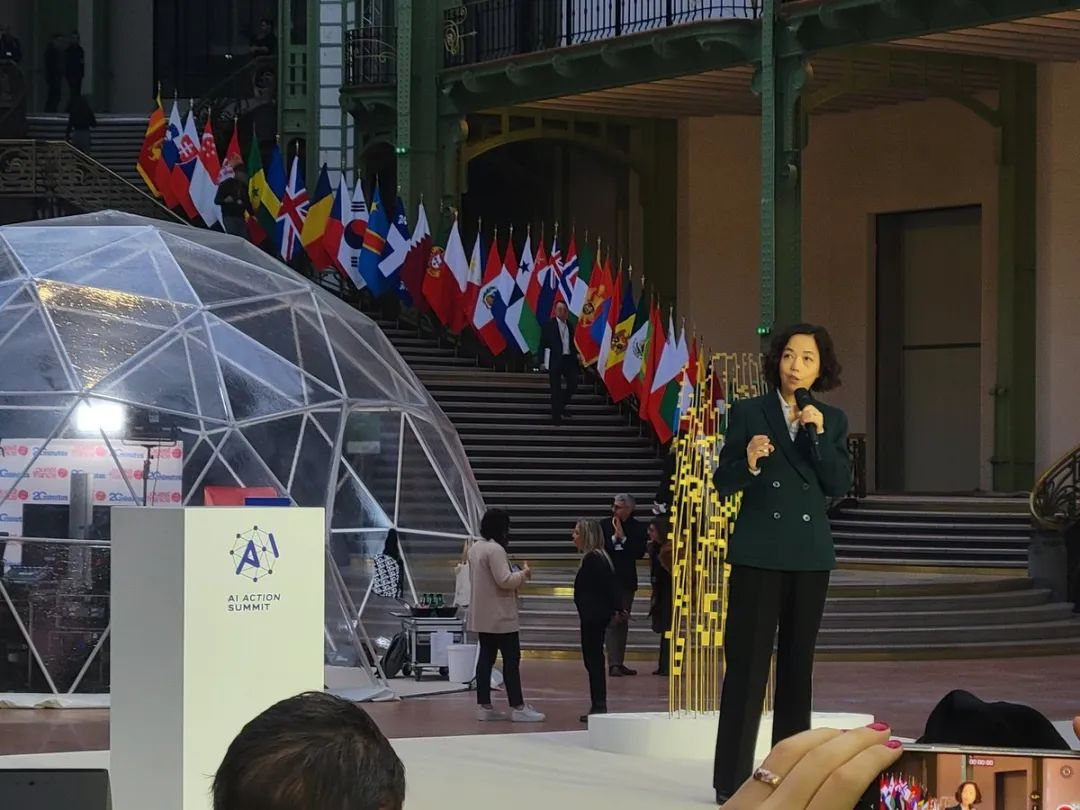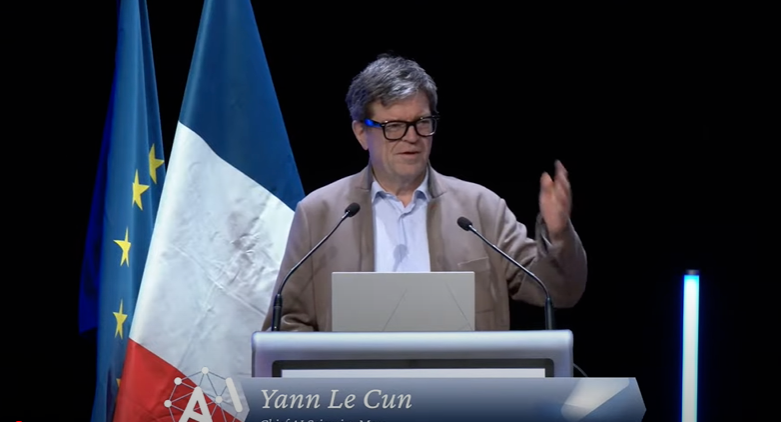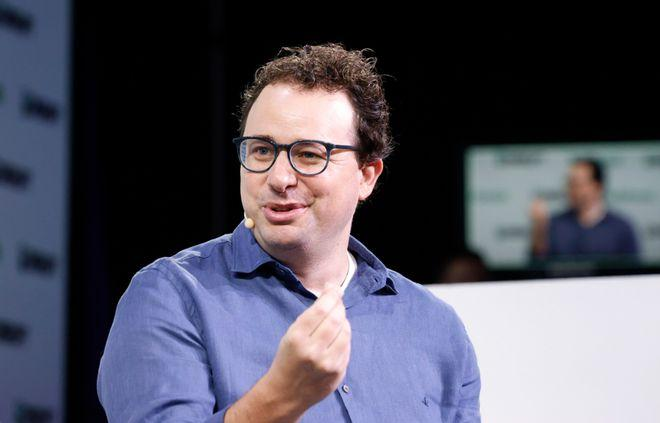Article source: AI Pioneer Officer
 Image source: Generated by AI
Image source: Generated by AI
From the 10th to the 11th, the Artificial Intelligence (AI) Action Summit was held in Paris, France. Heads of state and government from many countries, heads of international organizations, representatives of enterprises and research institutions attended the meeting to further deepen global artificial intelligence governance cooperation.
This summit is a follow-up to the first Artificial Intelligence Security Summit held by the UK in 2023. It aims to build global consensus and jointly promote the development of artificial intelligence for good.
It is worth mentioning that this summit was praised by the French media as a grand event of “European Awakening”.
The following is a summary of the core information of the summit:
US Vice President Vance: AI field adheres to the “America First” principle, Europe should not “over-regulate” AI

On the last day of the summit,Sixty countries including China, France and India have signed the Paris Declaration on Artificial IntelligenceThe declaration includes “openness”,”inclusiveness” and “ethics”, calling for strengthening coordination of artificial intelligence governance, advocating “global dialogue”, and calling for avoiding “market concentration” to improve the accessibility of AI technology.
The United States and the United Kingdom did not sign the declaration.
US Vice President Vance expressed the US position in his speech at the summit,He warned Europe against “over-regulating” artificial intelligence, saying it “could kill a booming industry.”
He saidThe Trump administration is actively adopting an “America First” approach,Ensure that the most powerful AI systems are built within the United States using chips designed and manufactured in the United States.
If Europe wants to be a “junior partner”,The existing digital regulatory system and the regulation of Internet content of so-called false information must be abolished.
Vance said that for the real future of AI, supervision of AI should be relaxed rather than strengthened:
U.S. technology companies still face ‘massive regulatory measures’ in EuropeVance said,”AI will bring countless revolutionary applications in multiple areas such as economic innovation, job creation, national security, health care and protecting freedom of speech.Limiting its development now will not only unfairly favor existing players in the industry, but will also kill the most promising technologies this generation has witnessed.”
Vance believes that AI will promote productivity, but it will not and will never replace humans. AI will make us more efficient, more prosperous, and more free.
Macron: Three major reasons why Europe is lagging behind in AI

On February 11, at the AI Summit in Paris, Macron admitted in an interview with CNN in the United States that Europe has fallen behind in the AI field and is facing the risk of being left behind by the United States and China. He also called on Europe to formulate a proactive AI development strategy and catch up head-on.
Macron believes that European AI is currently facing three major bottlenecks:
Funding shortage:Macron emphasized that Europe must increase its investment in the AI field, especially to actively attract capital injections from the United States, Gulf countries and other places.
Insufficient computing power:Europe accounts for only 3%-5% of global computing power, far behind China and the United States. France hopes to leverage its energy advantages to vigorously develop data centers and strive to occupy 20% of the world’s share.
Regulatory shackles:Macron believes that cumbersome supervision is a stumbling block to the development of AI in Europe. He called for streamlining the regulatory process for AI start-ups, creating a more competitive business environment, and aligning with U.S. policies.
In this regard, Macron believes that Europe must take measures to protect local companies and relax investment restrictions to prevent the outflow of European funds.
He emphasized that the way to break the AI situation in France lies in supporting local AI forces. The French government is actively supporting Paris-based Mistral in an attempt to build it into a European AI leader that can compete with OpenAI.
In addition, France plans to build Europe’s largest supercomputer in the autumn of 2025.Provide strong computing power support for AI research and development.
Macron: France will invest 109 billion euros in AI, benchmarking the Stargate"

The day before the summit, French President Macron revealed in an interview with local media thatIn the next few years, French AI will receive 109 billion euros (approximately RMB 820.8 billion) in investment.
Earlier, U.S. President Trump announced that OpenAI, Softbank of Japan and Oracle of the United States will establish a joint venture called Stargate to invest US$500 billion in AI infrastructure in the United States within four years.
Macron believes that if France and Europe do not want to be eliminated in the development of global AI, they need to accelerate their catch up.
He pointed out that Europe’s first battle is investment, investment, investment.
Macron said that if Europe regulates before innovating, it will not help encourage innovative development.In the words of one European official, France hopes to use the summit to attract investors, especially those from Europe. The summit has become the Cannes Film Festival for continental European start-ups.
According to Macron, relevant investments include the previously announced construction of a 1 gigawatt AI data center in France by the United Arab Emirates. The project is expected to invest 30 billion euros to 50 billion euros.
In addition to the United Arab Emirates, U.S. and Canadian companies will also invest in the AI field in France. Canadian asset management company Bofeng Group plans to invest 20 billion euros in the next five years to build data centers and AI infrastructure in France.
Macron announced that local French companies, including telecom operator Iliad SA, telecom operator Orange SA and aerospace company Thales SA, will also invest in the AI field.
Li Feifei: AI is setting off a revolution of unprecedented depth and breadth

At the opening ceremony of the Paris AI Summit, Professor Li Feifei of Stanford University delivered a speech.
In this speech, Li Feifei started with the evolution of life perception 500 million years ago, and all the way to the Turing era, showing the grand historical context of AI development.For the first time, it systematically elaborated on the three pillars behind the rise of modern AI: breakthroughs in perceptual algorithms, inspiration from cognitive science, and leap in computing power.
she believes“There is no doubt that historians will call this period the ‘real first AI era’ in the future.
In her view,From any perspective, whether it is the number of students in the direction of artificial intelligence in computer science, the amount of investment, the number of start-ups; or technological breakthroughs, AI is setting off a revolution of unprecedented depth and breadth.
She also proposed three core values of people-oriented AI:Maintain human dignity, enhance human capabilities, and promote community development.
It also calls for putting aside science fiction imagination, adopting a pragmatic attitude to promote the development of AI, and building an open and diverse healthy ecosystem.
She said that AI is gradually acquiring the dimensions of “creation, understanding, reasoning and interaction” to interact with people and the environment in digital or physical three-dimensional space. We call it “spatial intelligence” and “embodied intelligence”.
Governance must be based on science rather than science fiction. The topic about AI is full of exaggerated hype and sensational descriptions, which often leads to various misguided governance policies on AI.
The rise of modern AI is mainly due toAlgorithms, data and computing powerThe combination of these three factors.
If these three factors are only in the hands of a few companies, the AI ecosystem will face many problems such as lack of curiosity-driven research, limited top educational talents, lack of resources for open source projects, and insufficient multidisciplinary cross-exploration.
Yang Likun: Future AI research should focus on model architecture innovation

On February 10, Yang Likun, chief AI scientist at Meta, delivered a speech at the Artificial Intelligence Summit in Paris.He criticized the current artificial intelligence’s excessive reliance on large language models and advocated a “world model.”
Yang Likun said that although the big language models have made significant progress, they have fundamental flaws, lacking a true understanding of the physical world, common sense reasoning, and the rapid, zero-sample learning capabilities demonstrated by humans and animals.Future AI research should focus on innovation in model architecture rather than just relying on expanding model size and data volume.
In addition, Yang Likun emphasized the key role of open source AI platforms in promoting innovation and preventing monopoly of this transformative technology, and warned of the risks of closed-source development and possible government restrictions on open source models.
Ultraman: AGI is approaching, and future milestones are AI reasoning capabilities and agents

On February 11, OpenAI CEO Sam Altman was interviewed at the Paris AI Summit. This dialogue centered on the accelerated development of artificial intelligence and OpenAI’s vision.
Sam Altman believes that AGI is approaching, and major milestones in the future will be AI’s reasoning capabilities and AI agents, especially in the fields of software engineering and scientific discovery.
He said: “I personally very much look forward to continuing to improve the reasoning capabilities of our models and using this capabilities to complete more difficult, complex, and longer-term AI Agent tasks. AI agents for software engineers who can write software are a direction that we pay special attention to. In the long run, AI capable of scientific research will be one of the most important forces of change.“
The economic opportunities brought by AI are huge, and companies should actively explore the potential of AI in improving efficiency and creating new products.
Sam Altman also made it clear that OpenAI will not be sold and its mission is to promote the development of AGI to benefit all mankind.
It is worth mentioning that during the summit, Sam Altman also discussed the rapid development of artificial intelligence and his views on investment in AI infrastructure with host Katie Prescott on the TimesTech podcast.
He pointed out that although the emergence of DeepSeek broke the traditional “computing power myth” and the “Stargate” project has invested US$500 billion, it is far from enough to meet future needs.
Altman boldly predicted that a $5 trillion computing cluster will be needed in the future to support the continued development of AI technology.
Anthropic CEO: AI will become a new state in 2026 or 2027

Dario Amodei, CEO of AI startup Anthropic, attended the summit, but did not sign the relevant commitment.
On Tuesday, he posted a personal statement about the Paris AI Summit on Anthropic’s website, saying the summit was a “missed opportunity” and urged the AI industry and governments to “act more quickly and clearly.”
Given the speed of technological progress, future summits need to focus more on and accelerate action on a number of issues.
He believes that by 2026 or 2027, the capabilities of AI systems will be regarded as a new state, which is equivalent to the intelligence level of “a genius country.” This change will have far-reaching economic, social and security implications.
In his statement, he explained the importance of maintaining AI’s leadership and security, and highlighted the impact of AI on the labor market and the economy and society.
While AI has the potential to significantly boost global economic growth, it can also have a highly disruptive impact. The “land of genius in the data center” may be the biggest change to the global labor market in human history.
He called on the government to use more of its resources to carry out similar work and ultimately ensure that everyone can share the economic benefits of AI.



